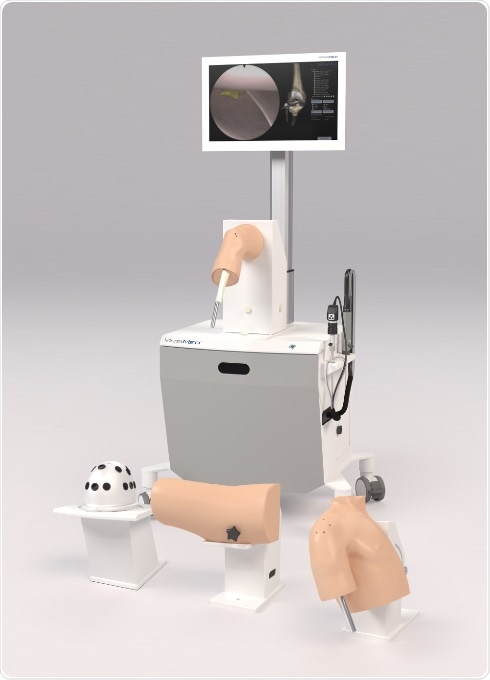Since 2013, every doctor planning to specialize in orthopedics in Switzerland has had to pass an exam on a VirtaMed ArthroS™ simulator. This improved the quality of the exam so much that the Swiss Orthopaedics certification board president PD Dr. Ariane Gerber Popp can’t even imagine organizing the test without a simulator.

Image credit: VirtaMed
Dr. Ariane Gerber Popp has worked as an orthopedic surgeon for 25 years, and she has always been passionate about education. “I think teaching is a very important part of our work”, she explains. Since 2015 Dr. Gerber Popp has been the head of the continuous education and the certification committees at Swiss Orthopaedics, the society for all orthopedic surgeons in Switzerland. The society is responsible for issuing certificates and overseeing the professional training both before and after the certification, and Dr. Gerber Popp was honored to be invited to this position as the first female surgeon.
The new annual orthopedic certification examination consists of three parts: anatomy, pediatric orthopedics and tumors, as well as a written test. The VirtaMed ArthroS™ is used in the part covering anatomy in order to evaluate how the candidates handle tools, how they navigate in the joint, and how they visualize the relevant anatomic landmarks. Due to a transition period in the exam structure, a record-high 160 doctors participated in the most recent exam in November 2016. During a usual year, some 80 new surgeons earn their orthopedic certification in Switzerland.
The integration of the VirtaMed ArthroS™ Knee and Shoulder modules improved the quality of the exam, Dr. Gerber Popp explains, as the test didn’t cover arthroscopic skills at all before 2013. After all, arthroscopy is an important part of an orthopedic surgeon’s work, so these skills should be evaluated for the certification. Because organizing cadavers of comparable quality for every single candidate would be horribly expensive at best, and simply impossible at worst, doing the exam without a simulator would mean returning to the days of not testing arthroscopic skills. “We will not take a step backwards”, Dr. Gerber Popp assures.
Simulator training before the exam: “We are the lucky ones”
Dr. Pascal Schenk, a senior physician at the Balgrist University Hospital in Zurich, earned his certification in the latest exam. Dr. Schenk had to do a diagnostic tour on the ArthroS™ Knee and name all the anatomical parts he found. Then he got to use a modified arthroscope to “catch the stars”, in other words locate and remove star-shaped foreign objects to demonstrate his triangulation skills with both dominant and nondominant hand. “If you’re not used to arthroscopic procedures, that is the most difficult part”, Dr. Schenk explains.
Now that the certification exam measures these arthroscopic skills, Dr. Gerber Popp admits the test is even more demanding than before: young surgeons need to have more skills at an earlier point in their careers. Nonetheless, Dr. Schenk did not feel that having the simulator as part of the exam would have increased his stress; just like Dr. Gerber Popp, Dr. Schenk sees that arthroscopy is such an important part of the work that it deserves to be included in the certification process.
Dr. Schenk realizes he might have had an advantage in the exam: the Balgrist University Hospital has a VirtaMed ArthroS™ simulator of its own, so Dr. Schenk and his colleagues could train as much as they wanted before the exam to gain the needed arthroscopic skills. Furthermore, Balgrist has helped VirtaMed develop the ArthroS™ simulator since the very first knee model that came out in 2012, and simulation training has been an integral part of the clinic’s curriculum for years. “We are the lucky ones”, Dr. Schenk admits; the simulator was in even heavier use than normal as the examination date approached.
The VirtaMed ArthroS training modules extend from basic introductory courses to advanced procedures, such as ACL reconstruction; the learners range from beginners to specialists. Dr. Gerber Popp has a clear opinion on the future of orthopedic training in Switzerland: every aspiring orthopedic surgeon should have access to high quality simulator training.
VirtaMed ArthroS™ Simulator Used for Swiss Orthopaedics Board Exam